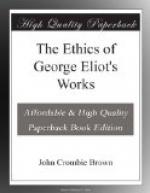“Father, my soul is weak, . . . . . . . . But if I cannot plant resolve on hope, It will stand firm on certainty of woe. . . . Hopes have precarious life; But faithfulness can feed on suffering, And knows no disappointment. Trust in me. If it were needed, this poor trembling hand Should grasp the torch—strive not to let it fall, Though it were burning down close to my flesh. No beacon lighted yet. I still should hear Through the damp dark the cry of gasping swimmers. Father, I will be true.”
The scenes which follow, first with her lover, then with her lover and her father together, present the culmination at once of her trial and of her steadfastness. Hitherto she has made her choice, as it were, in the bodily absence of that love, the abnegation of whose every hope gives its sharpness to her crown of thorns. Now the light and the darkness, the joy and the sorrow, the love whose earthly life she is slaying, and the life of lonely, ceaseless, lingering pain before her, stand, as it were, visibly and tangibly side by side. On the one hand her father, with his noble presence, his calm unquestioning self-devotion, his fervid eloquence, and his withering scorn of everything false and base, represents that deepest in humanity—and in her—which impels to seek and to cling to the highest good. On the other her lover, associated with all the deeply-cherished life, joy, and hope of her past, pleads with his earnest, impassioned, almost despairing eloquence, for her return to happiness. More nobly beautiful by far in her sad steadfastness than when she glowed before us as the “child of light” upon the Placa,—
“Her choice was made. . . . . . . . Slowly she moved to choose sublimer pain, Yearning, yet shrinking: . . . . . . firm to slay her joy, That cut her heart with smiles beneath the knife, Like a sweet babe foredoomed by prophecy.”
To all the despairing pleadings and appeals of her lover she has but one answer:—
“You must forgive Fedalma
all her debt.
She is quite beggared. If
she gave herself,
’Twould be a self corrupt
with stifled thoughts
Of a forsaken better. . . .
Oh, all my bliss was in our love,
but now
I may not taste it; some deep energy
Compels me to choose hunger.”
What that energy is, we surely do not need to ask. It is that deep principle of all true life which represents the affinity—latent, oppressed by circumstances, repressed by sin, but always there—between our human nature and the Divine, and through subjection to which we reassume our birthright as “the sons of God”; conscience to see and will to choose—not what shall please ourselves, but—the highest and purest aim that life presents to us.




